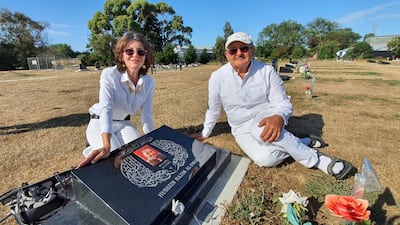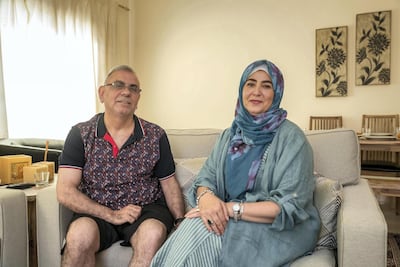Dressed all in white, Janna Ezat took an iPad with her murdered son's face displayed on it in one hand, a phone blaring music from it in the other, and danced.
Ezat's face was euphoric as she swayed held both devices atop her head and from side to side outside her front door. Her smile was triumphant, appeased. She was finally at peace.
Ezat's reaction to the shock guilty plea from the Australian far-right terrorist who killed her son, as well as 50 others, in two mosques in the Christchurch massacre last year, might have been slightly different had New Zealand not been in its first 24 hours of lockdown due to the Covid-19 pandemic.
She had wanted to be there, at the trial, to watch the terrorist enter his plea. But the lockdown meant that wasn't possible; only the imams of the Al Noor and Linwood mosques could attend. Instead, she awoke to the news from a journalist calling her for a comment on the shock reversal.
He had previously denied 51 charges of murder, 40 of attempted murder and one of engaging in a terrorist act, but changed his plea after a hurriedly arranged court hearing.
"I was shocked because I didn't know, I thought I was dreaming," Ezat tells The National.
"I dressed up in white, played music and started dancing."
That video has since been posted to Facebook, as Ezat's way of communicating her happiness with the outcome to friends and family. The song playing from the phone is an Arabic one, with the lyrics "sway with wind and love".
"That's what I was doing, swaying," Ezat says. "Because justice will be served."
The renowned calligraphy artist, who is originally from Iraq's Mosul but previously lived in Abu Dhabi, lost her son Hussein Al Umari when he was gunned down trying to stop the shooter in Al Noor Mosque. The past year spent adjusting to life in the aftermath of a terrorist attack has been much harder than she could have ever imagined.
Ezat cuts a gaunt figure in recent photos posted to social media. She’s lost a large amount of weight in the past 12 months.
"Only God knows how I'm suffering," she told The National earlier this month, as the one year anniversary of the shootings ticked by. "I thought after one year I would be OK, but it's the opposite."
Entering his plea on Thursday, the terrorist simply told Christchurch High Court by videolink from Auckland Prison "Yes, guilty", while staring intently at the camera dressed in a grey top. Journalists were present, but just six of them, spread well apart due to the current health crisis.
No reason was given for the change, which means he will no longer need to stand trial over the shooting.
Judge Cameron Mander recorded convictions on all charges and said the man would be sentenced at a later date. This would take place when the court system had returned to normal, "at a time when victims and their families can attend the court in person".
Prime Minister Jacinda Ardern said she let out "a massive sigh of relief" when she heard of the guilty pleas.
"The whole nation, but particularly the Muslim community, has been spared a trial that could have acted as a platform," she said.
Adeeb Sami watched the shooter enter the plea by video link, after he woke to the news at his home in Al Ain. Sami was shot twice in Al Noor mosque, as he shielded his son Ali from the onslaught of bullets. For him, the last year has been a chaotic mix of ups and downs, operations and pain.
"I woke up and saw my phone with thousands of messages describing what happened," he says.
"I have mixed feelings; happiness for the end of this drama, but sadness because this guy lost his life for nothing. Fifty-one people lost their lives, so 51 families are affected by what he did.
"It was fantastic news for us to close this chapter from our lives and start thinking about how we will pass this stage."
Sami does not know why the shooter abruptly changed his plea. However, he believes a clue lies in the man's noticeable change in appearance over the last year.
"He's lost a lot of weight, I thought he's not the shooter – that's not the guy," Sami says.
"When I saw his face, I had a feeling that something has changed. Hopefully, he will find a way in his dark heart, or that the light again came to his heart, and that he [knows he] did something wrong, admits that it's wrong and learnt the lesson."
Mr Sami holds no hatred towards the shooter; in fact, he has long forgiven him. Instead, he believes the wider society is to blame.
If there was to be one overarching action or lesson taken from the shooting, he says, it's eradicating Islamophobia.
"We have to blame the whole world that resulted in changing this young man into a killing machine. We have to blame ourselves, we were not open enough to everybody. Nobody understood Islam. We can blame white supremacists, we can blame radicals, we can blame a lot of groups who led this young guy to do what he did. I cannot blame him alone – a lot of things led to that result and blaming only the shooter is unfair. Nobody is born with hate, hate grows," he says.
"He should now seek forgiveness from us as well as from God. What he did was shocking. His soul is full of fate, and he should start cleaning his soul by seeking forgiveness from everybody. Hopefully, he will be a better person. he is still young, he has a chance."


